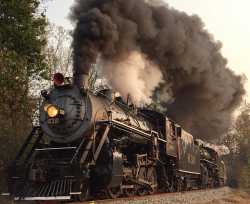>>8068820It's a really good question Anon.
One word that quickly comes to mind, particularly about steam trains, seeing as we're in this thread, would be 'nostalgia'; even if that nostalgia is often heavily rose-tinted and thus generally completely ignores what an utterly labour-intensive maintenance menace steam trains often were/are - as a wise man once said (paraphrasing here) 'everyone wants to be a steam train driver, however for most being the night-shift steam train maintainer is not quite the thing.'
But for trains in general, the design aesthetics of trains, whether inside and/or out, is what lights some folks candle; while for other folks what especially toots their horn is the heavy engineering that goes into a trains production and operation, i.e. people are often just fascinated by really big and/or very technical things built by other humans, such as a multi-carriage train that weighs many hundreds of tons that can move at all let alone move so quickly and with such purpose, this is also part of why people also love things like trucks (big rigs), aircraft (civilian and/or military), and heavy construction equipment
Then there are those folks who are only interested in a specific type of train based on its method of power supply, e.g. steam, gas turbine, diesel, or electric; perhaps because of the sights, the sounds, and/or (for steam, turbine, and diesel trains especially) the smells
And then, for whatever reason, there are those people who have a particular favourite model of train and they'll go to often extraordinary lengths to even see an example of their favourite train in the wild, if not make a journey on one if/when the chance comes up, e.g. BR Class 37 or BR Class 43 to name a couple of popular British examples; or maybe it's a particular (iconic and usually specifically named) train service such as 'The Flying Scotsman' that particularly oils their piston
There's very likely other reasons people have too, but that's just a few examples.

